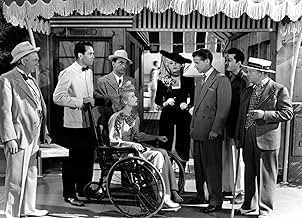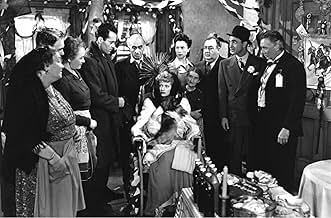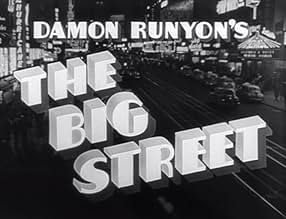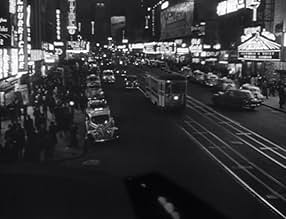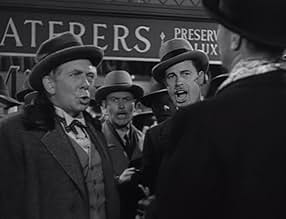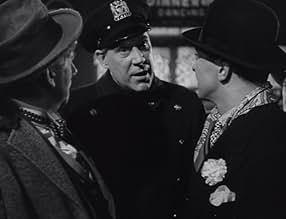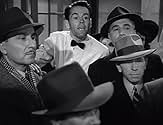CALIFICACIÓN DE IMDb
6.4/10
1.8 k
TU CALIFICACIÓN
Un ayudante de camarero que está enamorado de una artista de club nocturno, se acerca más a ella después de que queda paralizada por un ataque de su novio gángster.Un ayudante de camarero que está enamorado de una artista de club nocturno, se acerca más a ella después de que queda paralizada por un ataque de su novio gángster.Un ayudante de camarero que está enamorado de una artista de club nocturno, se acerca más a ella después de que queda paralizada por un ataque de su novio gángster.
- Dirección
- Guionistas
- Elenco
- Premios
- 2 premios ganados en total
William T. Orr
- Decatur Reed
- (as William Orr)
Don Barclay
- Eating Contest Emcee
- (sin créditos)
Mary Bayless
- Nightclub Patron
- (sin créditos)
Louise Beavers
- Ruby - Gloria's Maid
- (sin créditos)
Anthony Blair
- O'Rourke
- (sin créditos)
- Dirección
- Guionistas
- Todo el elenco y el equipo
- Producción, taquilla y más en IMDbPro
Opiniones destacadas
I saw this film in the late '60's on our local TV station. It was not unusual to catch B movies starring our television personalities back in the day. What a film! I cried at the end. What shines through is the portrayal of the class levels within American society then. Lucille Ball's dame certainly internalized the idea that she was above the class of Henry Fonda's Pinky even while she subsisted on the food he brought home for her after she was no longer a gangster's moll. Henry Fonda's Pinky was a true codependent, picking her up from the floor, keeping her alive, even moving her from cold, icy New York City to the east coast Eden of Miami (shades of Midnight Cowboy!)with nary a thank you from this ungrateful woman. Through a plot device, Pinky and the busboys don tuxedos at the end so she condescends to be carried up the stairs by one of their own, enabling her self deceit that she is an upper class lady. Someone wrote it was too much of a downer to have been successful when released and couldn't be made today as the bit players do not exist to round out the cast. Rise above the limitations of both eras and enjoy this film.
This interesting story failed to make it big with audiences in its initial release, but is actually a noteworthy picture, nonetheless. This unlikely story has Henry Fonda as Little Pinks, a shy, timid busboy, who's obsessed with Lucille Ball's self-absorbed, mean-spirited torch singer. Despite her poor treatment of him, he continues to worship her. During an argument with her louse of a boyfriend, he (the boyfriend) pushes her down a flight of stairs. Paralyzed and desperate, Gloria moves in with Pinks. The wheelchair-bound diva alienates everyone around her with her anger and venomous commentary. But Pinks doesn't let it bother him. Instead the "odd couple" go on an unusual roadtrip together. He pushes her in her wheelchair all the way to Miami - pretty dumb, really !
Ball is excellent, and in top form. It's great to see her in such an unusual role (see also 1947's "Lured"). Fonda is great, too, as the innocent and smitten young man. And the rest of the cast is good; especially, the always fabulous Agnes Moorehead. Despite a good story and an excellent cast, the plot limps along at points, and the shoddy production value is unignorable. Plus, the whole "Let's push Lucy to Florida in her wheelchair" thing is utterly nuts! However, the final scene is an unforgettable melodramatic moment that is fascinating just for the fact that Ball is the center of it. It makes it worth sitting through the many drawbacks of this film just to see the ending scene.
Ball is excellent, and in top form. It's great to see her in such an unusual role (see also 1947's "Lured"). Fonda is great, too, as the innocent and smitten young man. And the rest of the cast is good; especially, the always fabulous Agnes Moorehead. Despite a good story and an excellent cast, the plot limps along at points, and the shoddy production value is unignorable. Plus, the whole "Let's push Lucy to Florida in her wheelchair" thing is utterly nuts! However, the final scene is an unforgettable melodramatic moment that is fascinating just for the fact that Ball is the center of it. It makes it worth sitting through the many drawbacks of this film just to see the ending scene.
Years before Damon Runyon got Broadway and screen immortality with Guys and Dolls, one of his short stories was adapted for the silver screen concerning the unrequited love of a bus boy for a Broadway entertainer. That story was The Big Street and the title is named for the street that Runyon chronicled, Broadway.
Though The Big Street got good reviews for its stars Henry Fonda and Lucille Ball, the subject matter was way too much of a downer for mass audience appeal. The plot as it is tells the story of Little Pinks who is madly in love with this nightclub entertainer who being the mistress of gangster Barton MacLane, can't see him for beans and wouldn't look up from the table to try.
That all changes when MacLane slaps her so hard she falls down a flight of stairs and becomes paralyzed. All abandon her then and in truth she didn't exactly near and endear herself to too many. That is except for Fonda and the Broadway characters he lines up to give her a helping hand.
A movie like The Big Street could not be made today because we don't have the rich assortment of character players to entertain us. The people Damon Runyon created were made for such performers as Sam Levene, Ray Collins, Millard Mitchell, etc. And of course the two best performers who steal the film from the leads when they're on are Agnes Moorehead and Eugene Palette. Moorehead didn't do too much comedy and her gift for it would not be tapped again until she was Endora in Bewitched.
Lady for a Day and Guys and Dolls enjoyed much greater success because they were done in a comic vein. My guess is that is what people expect when they see Damon Runyon on a theater program credit.
Still The Big Street is nicely-nicely done as Eugene Palette and Stubby Kaye would say.
Though The Big Street got good reviews for its stars Henry Fonda and Lucille Ball, the subject matter was way too much of a downer for mass audience appeal. The plot as it is tells the story of Little Pinks who is madly in love with this nightclub entertainer who being the mistress of gangster Barton MacLane, can't see him for beans and wouldn't look up from the table to try.
That all changes when MacLane slaps her so hard she falls down a flight of stairs and becomes paralyzed. All abandon her then and in truth she didn't exactly near and endear herself to too many. That is except for Fonda and the Broadway characters he lines up to give her a helping hand.
A movie like The Big Street could not be made today because we don't have the rich assortment of character players to entertain us. The people Damon Runyon created were made for such performers as Sam Levene, Ray Collins, Millard Mitchell, etc. And of course the two best performers who steal the film from the leads when they're on are Agnes Moorehead and Eugene Palette. Moorehead didn't do too much comedy and her gift for it would not be tapped again until she was Endora in Bewitched.
Lady for a Day and Guys and Dolls enjoyed much greater success because they were done in a comic vein. My guess is that is what people expect when they see Damon Runyon on a theater program credit.
Still The Big Street is nicely-nicely done as Eugene Palette and Stubby Kaye would say.
Broadway busboy Henry Fonda (as Agustus "Little Pinks" Pinkerton) idolizes self-centered lounge singer Lucille Ball (as Gloria "Your Highness" Lyons). When Ms. Ball falls on hard times, Mr. Fonda gets to lend a helping hand. The pair move to Florida, but tragedy follows
Although "Guys and Dolls" (1955) remains most representative, "The Big Street" captures the spirit of writer Damon Runyon's characters better than most Hollywood efforts, probably because Mr. Runyon produced.
They weren't the author's first choice for the leads, but Fonda's innocent charmer and Ball's selfish tragedienne are exemplary characterizations. Ball is especially noteworthy, as she did not receive many opportunities to play against type, and places herself squarely on par with the more successful "Golden Age:" actresses of the 1930s and 1940s; she is startling. Director Irving Reis coordinates his fine cast and crew very well, making camera angles and movement seem uncommonly fresh.
******** The Big Street (8/13/42) Damon Runyon : Irving Reis ~ Lucille Ball, Henry Fonda, Agnes Moorehead, Eugene Palette
They weren't the author's first choice for the leads, but Fonda's innocent charmer and Ball's selfish tragedienne are exemplary characterizations. Ball is especially noteworthy, as she did not receive many opportunities to play against type, and places herself squarely on par with the more successful "Golden Age:" actresses of the 1930s and 1940s; she is startling. Director Irving Reis coordinates his fine cast and crew very well, making camera angles and movement seem uncommonly fresh.
******** The Big Street (8/13/42) Damon Runyon : Irving Reis ~ Lucille Ball, Henry Fonda, Agnes Moorehead, Eugene Palette
Damon Runyon's short story "Little Pinks" is turned by RKO into a solid acting showcase for Henry Fonda and Lucille Ball, also utilizing a troupe of colorful supporting players to their best advantage. Supper-club singer in New York City is crippled in a fall--and promptly loses her free ticket into high society. The only person who still cares for her is a smitten, well-meaning busboy; he hitchhikes all the way to Miami with the wheelchair-bound chanteuse, where they cross paths again with the well-heeled gangster who caused her unfortunate accident. The melodrama inherent in the main plot is suffused (and some may say strengthened) by the comedic overtures of the character turns, most especially by Eugene Palette and Agnes Moorehead as a couple who love to eat and argue. Ball, floundering at RKO in 1942, was quickly snapped up by MGM after this performance, and its clear why: her narcissistic songbird is self-centered and often ridiculously delusional, but your heart goes out to her anyhow. *** from ****
¿Sabías que…?
- TriviaLucille Ball's favorite of her films. She felt her performance was unjustly ignored by the Academy of Motion Picture Arts and Sciences (AMPAS).
- ErroresA gathering to raise money to send Gloria Lyons to Florida doesn't raise enough, so a suggestion is made to put it on a horse. A face-on shot of Horsethief shows him sitting down and pulling a paper from his inside pocket. He stands up and unfolds the paper, but then a long shot shows him just starting to take the paper from his pocket.
- Citas
Gloria Lyons: Love is something that gets you one room, two chins and 3 kids.
- Créditos curiososOpening credits: "Loser's Lane --- the sidewalk in front of Mindy's Restaurant on Broadway-- is not as high-toned a trading center as Wall Street, but the brokers are a lot more colorful. Generally they prefer to put their money on a prizefight or horserace, but when the action slows, anything can happen and it usually does. Tonight, for example, the citizens of the Lane are discussing the latest contest in their usual quiet way --"
- ConexionesFeatured in AFI Life Achievement Award: A Tribute to Henry Fonda (1978)
- Bandas sonorasWho Knows?
(1942)
Lyrics by Mort Greene
Music by Harry Revel
Performed by Lucille Ball at the New York nightclub (uncredited)
Reprised by her with Ozzie Nelson and Orchestra at the Florida nightclub (Vocals for Miss Ball by Martha Mears) (uncredited)
Played often in the score
Selecciones populares
Inicia sesión para calificar y agrega a la lista de videos para obtener recomendaciones personalizadas
- How long is The Big Street?Con tecnología de Alexa
Detalles
- Fecha de lanzamiento
- País de origen
- Idioma
- También se conoce como
- The Big Street
- Locaciones de filmación
- Miami, Florida, Estados Unidos(second unit - exteriors)
- Productora
- Ver más créditos de la compañía en IMDbPro
- Tiempo de ejecución
- 1h 28min(88 min)
- Color
- Relación de aspecto
- 1.37 : 1
Contribuir a esta página
Sugiere una edición o agrega el contenido que falta


